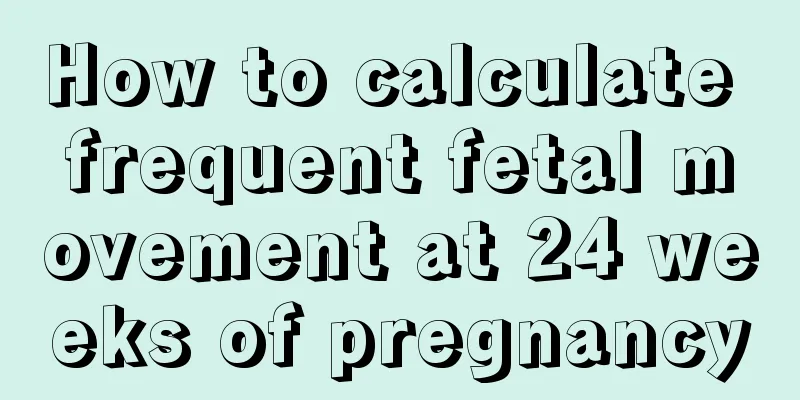Is it normal to have menstruation six months after giving birth?

|
We know that women do not have menstruation during pregnancy, and after giving birth, employees need a period of recovery and treatment. Generally, it takes about 3 months to 1 year for your menstruation to return to normal. So generally speaking, it is normal to have menstruation 6 months after giving birth. Let’s take a look at the reasons for this phenomenon! I hope mothers don’t need to worry too much. 1. Is it normal? The resumption of menstruation after childbirth varies from person to person. It may come as early as six to eight weeks after childbirth or as late as one or one and a half years after childbirth. Moreover, menstruation may become irregular due to the body's hormonal adjustments. The production of prolactin during breastfeeding will inhibit ovulation and also affect menstruation. Therefore, breastfeeding has the effect of delaying menstruation. Generally, menstruation will resume on average five to six months after breastfeeding. From a medical point of view, based on the tissue morphology of the endometrium, the ovaries may be able to ovulate as early as thirty-three to forty-two days after delivery. In addition, the presence of a corpus luteum after ovulation can also be observed six weeks after delivery. Therefore, if the mother is not breastfeeding, menstruation usually comes within six to eight weeks after delivery. Research data show that 40 percent of non-breastfeeding mothers resume ovulation six weeks after delivery; by eight to twelve weeks after delivery, only about 35 percent of mothers have not resumed ovulation and menstruation. About 25% of breastfeeding mothers will resume ovulation and menstruation within 12 weeks after delivery, and most breastfeeding mothers usually take until 18 weeks to fully resume ovulation. However, it is sometimes difficult to clinically determine the exact time of the first menstrual period after delivery, and a small number of women will begin to have intermittent bleeding of small to moderate amounts immediately after delivery. 2. What are the effects on breastfeeding? When menstruation comes, the amount of milk a breastfeeding mother produces generally decreases, and the quality of the protein and fat in the milk also changes slightly, with the protein content being higher and the fat content being lower. This kind of milk sometimes causes indigestion symptoms in the baby, but this is a temporary phenomenon and will return to normal after the menstrual period. Therefore, new mothers do not need to stop breastfeeding whether during or after their menstrual period. 3. Can I get pregnant if I don’t have my period? New mothers in the postpartum period can get pregnant even if they do not have their period. Because whether or not a woman can get pregnant depends on whether or not she ovulates. The resumption of ovulation is not necessarily synchronized with the resumption of menstruation, especially in the first few cycles after the resumption of menstruation, which are often menstrual cycles without ovulation. However, many people begin to ovulate before the resumption of menstruation, especially women who are not breastfeeding, whose ovulation often resumes earlier. Therefore, if a mother has sexual intercourse during breastfeeding, she may become pregnant at any time because ovulation has resumed. According to statistics, half of women who conceive during breastfeeding conceive before the return of their menstruation. Therefore, as soon as you start having sexual intercourse after childbirth, you should take contraceptive measures. Generally, menstruation will gradually return to normal within three months after giving birth. The specific time depends on the individual's physical condition and recovery situation. Some people will not return to normal until one year after giving birth. So as long as you don't have any obvious symptoms of discomfort, it is normal. Don't worry too much. IV. Precautions Postpartum lochia is not menstruation. Normally, after giving birth, a woman will have a bloody discharge from the birth canal, similar to menstruation. This bleeding from the placenta implantation site, mixed with secretions such as the decidua, tissue fragments, and mucus remaining in the uterus, is called lochia. The above is a detailed introduction to menstruation 6 months after delivery. There is no need to worry about this situation. Menstruation means that your uterus is recovering. Pay attention to see if the amount of vaginal bleeding is normal, and whether there are any changes in the quantity and quality of the usual leucorrhea. If there are any changes, be sure to inform us in time, because postpartum may affect various complications, especially inflammatory ascending infection. If not treated in time, it may lead to infertility. |
<<: What is the cause of menstruation during ovulation?
>>: How big is the belly at four and a half months of pregnancy?
Recommend
Introduction to the thickness of the fallopian tube
For women, the biggest difference between them an...
Why is there blood when I don't have my period?
A woman's menstrual cycle is generally about ...
Why do girls suddenly gain weight?
Compared with men, women are more concerned about...
What should I do if I have bloating and pain in my abdomen during early pregnancy?
Some pregnant women report that they often feel b...
Symptoms of Qi and Yin Deficiency in Women
Qi and Yin deficiency is actually a symptom of a ...
How to treat uterine prolapse?
What is the most common disease among women that ...
Warning signs behind female nipple discoloration
1. After a woman becomes pregnant, starting from ...
Pain in the buttocks during late pregnancy
The late stage of pregnancy is also a very critic...
How much do you know about the “five pillars” of diabetes treatment?
Diabetes is a metabolic disease characterized by ...
8 weeks pregnant breasts no longer swollen
When a woman is pregnant, her breasts are very se...
Why is there a small amount of menstrual flow after childbirth? What happened?
Many women have normal menstrual flow before givi...
Can I eat red dates if I have breast hyperplasia?
Breast hyperplasia has a relatively large impact ...
How long can I breastfeed after infusion during lactation
If you are sick and need infusion during breastfe...
Can I get pregnant if I have candidal vaginitis?
If you have candidal vaginitis, you should not ge...
What are the symptoms of embryo not implanting?
Some families may be anxious to have a baby, and ...









